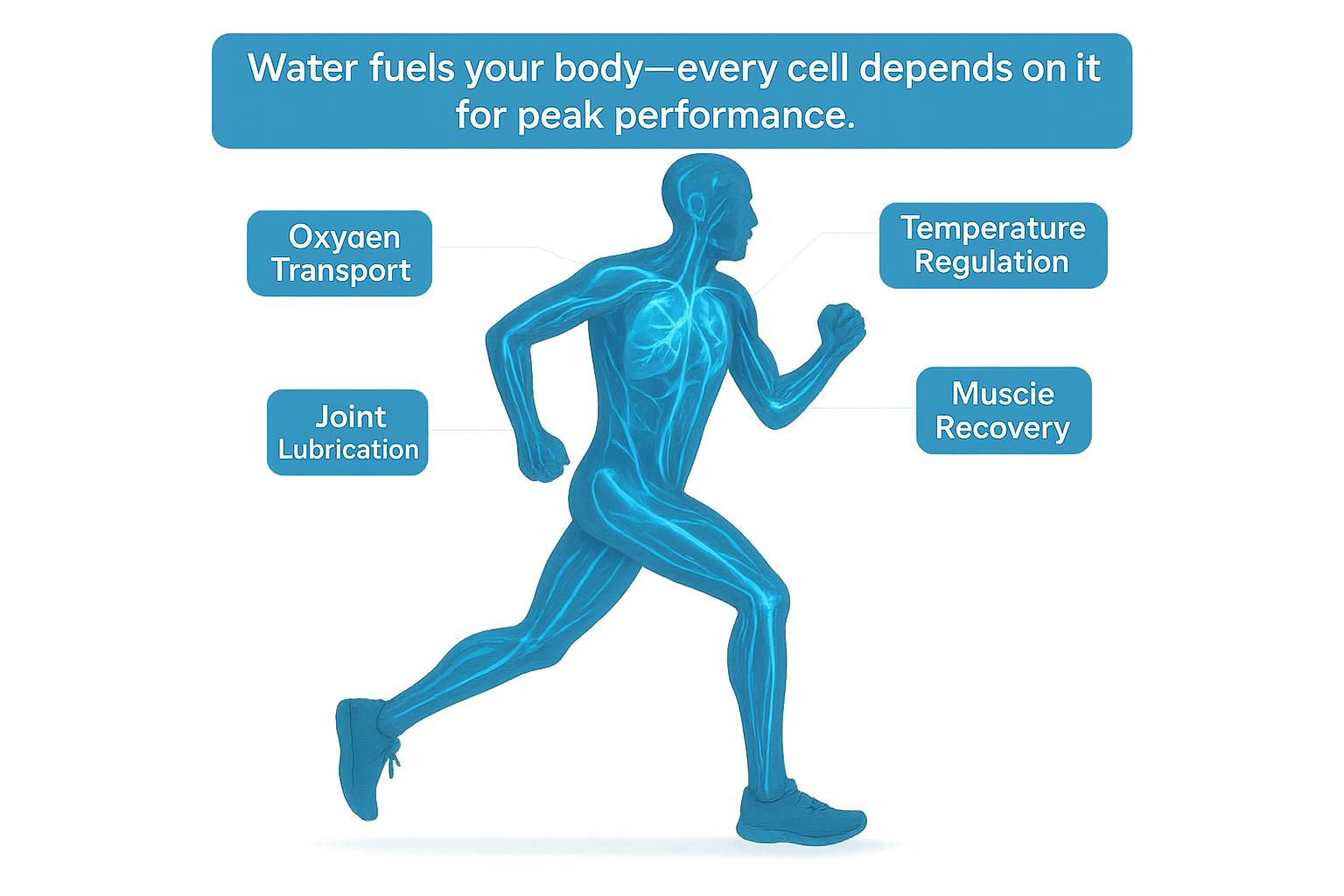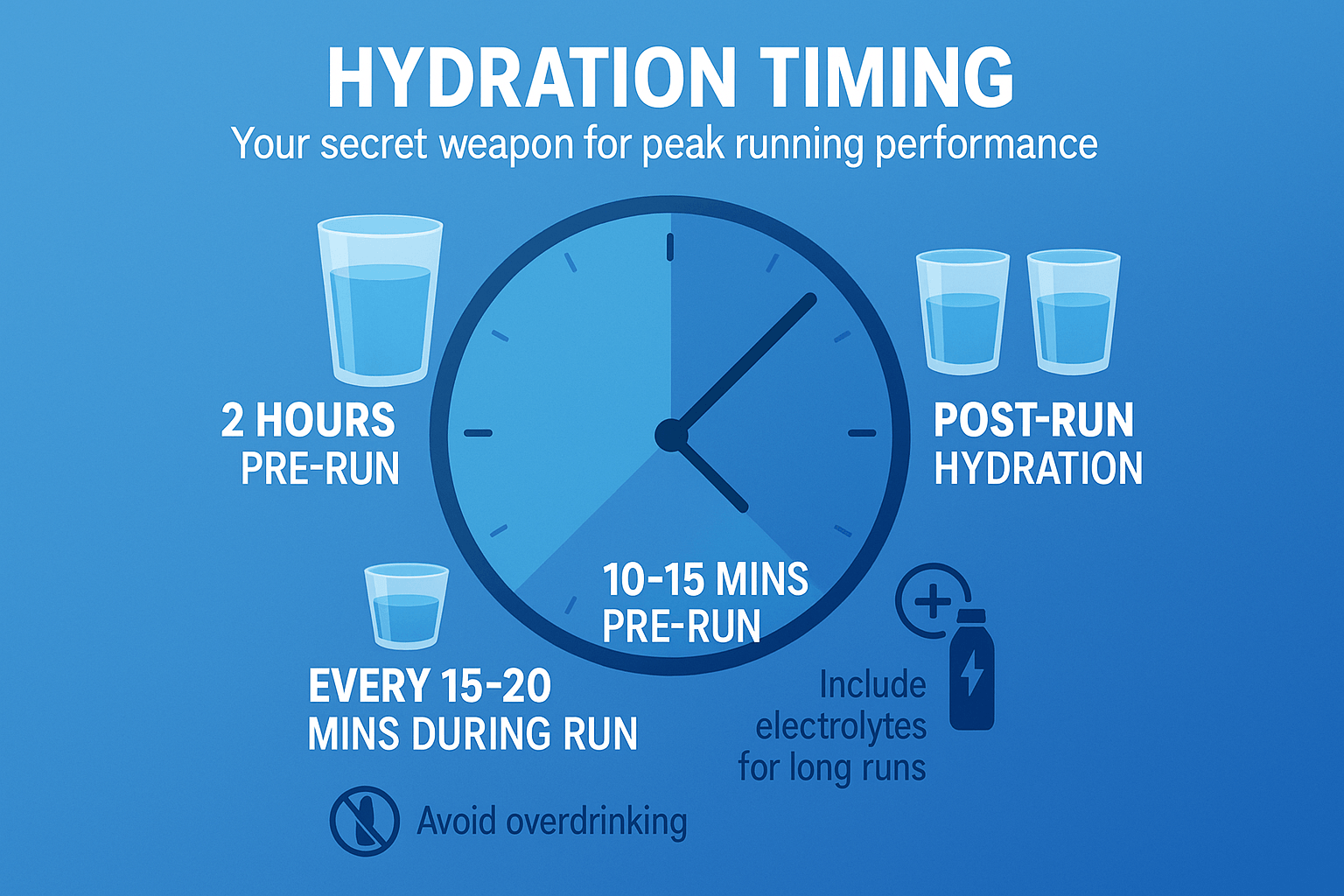Looking for practical guidelines on how much water should a runner drink? Then you’ve come to the right place.
Here’s the truth. Proper hydration for runners is key both during the winter season and through the long hot summer.
In fact, if you do any sort of exercise, drinking enough water, before, during, and after your workouts is vital for performance and injury prevention.
This shouldn’t surprise you at all!
Here is the good news.
Staying well-hydrated while running is not rocket science.
This blog post will teach about the importance of water intake in runners as well as how to stay properly hydrated for your runs.
Feel excited?
Let’s lace up and dig in.
The Importance Of Proper Hydration For Runners
Human beings can survive for as long as a month without food.
But, devoid of water, we would perish in three to four days, science says.
Why it’s the case is no mystery.
The human body is about 60 to 70 percent water, and every living cell in the body; it needs to keep functioning.
More specifically, the brain is composed of 95 percent water; lungs are almost 90 percent, blood is 82 percent water.
Here are some of the main functions of water:
- Water flows through the bloodstream, carrying both nutrients and oxygen to cells and flushing waste out of your body.
- Water cushions our soft tissues and acts as a lubricant for our joints.
- Water facilitates the proper digestion of food to provide energy. Without it, your digestion system will grind to a halt.
- Water keeps your skin healthy by eliminating toxins.
- Water regulates body temperature through sweating and respiration.
For these reasons, it’s not a secret that water is the most critical nutrient for growth, recovery, and health.
Dehydration – Why Do you Need to Avoid it?
Dehydration strikes when you’ve lost too much liquid without replacing it.
When this happens, your organs, cells, and tissues will fail to function as they should, leading to dangerous, even life-threatening, complications.
You might feel easily winded, have muscle cramps, experience loss of coordination or dizziness during your workout as well as other acute symptoms.
The Process – Dehydration and Blood Volume Levels
So, what happens to your body as you become dehydrated?
According to biology, our blood is about 82 percent water.
When you run, you sweat.
As you sweat, your blood volume drops, thus less blood returns to the heart.
Next, the volume of blood your heart pumps with each beat declines, which can hinder oxygen- and nutrient-rich blood from reaching your working muscles.
This leads to a reduction in your aerobic energy production, forcing you to slow down.
Research has found that runners who lose as little as two percent of body weight through sweating experience a drastic drop in blood volume, which, in turn, forces the heart to work harder to circulate blood.
A reduction in blood volume may also cause fatigue, muscle cramps, dizziness, nausea, and heat-induced illnesses, such as heat stroke and heat exhaustion.
Severe cases may result in death.
Additional Resource – What’s the best temperature for running?
Mild VS Severe Dehydration
Dehydration levels can range from mild to serious, even life-threatening cases.
Mild dehydration can typically be treated at home, whereas severe cases of the condition require immediate medical attention in a hospital or emergency care setting.
The most common symptoms of dehydration include:
Mild Dehydration
- Dry, cool skin
- Dry, muggy mouth
- Fatigue or sleepiness
- Constipation
- Headache
- Lightheadedness or dizziness
- Muscle cramps
Severe Dehydration
- Extreme thirst
- Sunken eyes
- Confusion and irritability
- Rapid breathing and heart rate
- Low blood pressure
- Dark urine, or no urine at all
- Fever
- Loss of consciousness (in serious cases).
We are a dehydrated Nation
Most people don’t drink the recommended daily amount of water, which is 60 to 70 ounces of liquid—runners included.
In fact, research shows that up to 75 percent of Americans might not be meeting this daily recommended water intake.
How Much Water Should a Runner Drink
So, how much water should you drink while running?
Here is the thing.
There are no universal rules for how much liquid to drink because everyone is different.
In general, your hydration needs depend on the following factors:
- Training intensity,
- Fitness level,
- The clothes you’re wearing,
- Your sweat rate, your physiology, and most importantly,
- The heat and humidity in your environment.
But, all in all, a good general guideline is to aim to drink half of your body weight in ounces each day.
So, for instance, if you weigh 170 pounds, you typically want to try to drink 85 ounces of water per day.
That might seem like too much at first, but if you get yourself into the habit, you’ll be able to reach that target.
Additional resource – Your guide to Charleys Horse in runners
How to Stay Well Hydrated While Running
Here are a few ways that can help reach your daily quota of the life-granting liquid:
Drink The Whole Day
The golden principle is to drink plenty of water throughout the day to stay well hydrated.
Build the habit of drinking water all day long.
Drink first thing in the morning and right before you doze off to sleep.
Also, keep a full water bottle nearby, whether at your desk at work or in your car.
This can serve as a reminder to keep your hydration topped up.
Additional Resource – Running in polluted areas
Start Your Runs Well Hydrated
Have enough water before a run.
In general, this might translate to drinking 500 to 900 ml—the equivalent of two to four glasses of water —in the two to three hours before a run.
Just keep in mind that if you feel thirsty, then you’re already dehydrated.
Note: Do not drink too much water before a workout as doing so can force your kidneys to flush it out, resulting in frequent trips to the bathroom.
Overdrinking can also dilute your body’s sodium balance and boost your risks of hyponatremia.
Hydration During Long Runs
For long distance running, shoot for 150 to 250 ml—roughly one cup—for every 15 to 20 minutes of training.
You should also consider having a sports drink containing carbs and electrolytes for runs over an hour, especially when training in hot weather.
No excuse for lack of water stops
Keep a hydration plan ready, and consider investing in a hydrogen water bottle for added benefits. Hydrogen-rich water is known for its antioxidant properties, which help reduce inflammation and support faster recovery, making it a great choice for runners who need optimal hydration and performance.
You can also use a hydration running vest.
After Your Runs
In general, you can lose up to half a liter for each hour of running.
This can be considerably higher when exercising in warm and/or hot weather.
So, immediately post-run, drink another two to three glasses within 10 to 20 minutes.
To Conclude
- Drink two glasses—500ml—two hours before a run.
- Drink one to two cups—250 to 500 ml—10 to 15 minutes before a workout.
- Drink third a cup—about 75 to 250 ml—every 15 to 20 minutes during running.
- Drink two to three glasses—500 to 750 ml—in the 30 minutes following a workout.
Keep in mind, as a runner, you can shed up to half a liter of fluid for each hour of running.
This can get drastically higher when running in hot weather.
Be careful.
Monitoring Hydration Levels
These tips are the basic rules of thumb when it comes to proper hydration, but it’s vital to remember that everyone’s fluid needs are different.
Some runners sweat more than others.
That’s why to make sure that you’re not under- or over-hydrating your body, you need to learn to monitor your hydration levels.
Weigh Yourself
To determine how much water you need, know your sweat rate.
Weighing yourself both before and after each run can help you measure how much water you lose typically through sweat, which, in turn, helps you determine fluid needs.
This is especially a good strategy if you’re running throughout the hot season.
The Formula
As a rule of thumb, drink 16 ounces of water for every pound you’ve lost during a workout.
So, for example, if you are three pounds lighter after a 90-minute run, aim to drink 48 ounces in the hours following your workout.
Just don’t swig it all at once.
Aim to drink about 500ml in the first hour after your run, then keeping sipping water every 10 to 15 minutes until you have reached your target.
On your next long run, aim to drink 60 ounces of more before or during the workout.
The Pee Test
Another easy way to tell if you’re drinking enough is the urine test.
This may sound like an odd thing to do, but assessing the color of your pee is a proven strategy to monitor hydration levels, according to the University of Connecticut research.
Typically, your urine color should be light yellow—think lemonade.
But once it gets too dark (think apple juice), or particularly smelly, you need to drink up.
That said, clear, transparent urine is a bit excessive.
Still unsure which belong to which?
You can print the urine color guide and take it inside your pocket or running bag.
Wait wait… is there such a thing as drinking too much water.
Of course, there is.
Additional resource – Ice bath for runners
Do not Overdrink
Finally, it is possible to drink too much water while running.
In fact, overhydrating before (and sometimes during) a workout is a common mistake many fluid-conscious runners make.
In the scientific circles, this case is known as Hyponatremia, a condition of low blood sodium, usually associated with Overhydration.
Along with dehydration, this condition is one of the most common medical complications in endurance training and racing.
Mild cases of the condition will cause nausea and bloating, whereas extreme forms of hyponatremia can cause confusion, vomiting, and seizures, even death.
A survey revealed that 9 out of the 17 runners who were hospitalized during an 89KM Marathon in South Africa had been overdrinking—drinking too much water than their bodies’ needs.
To Err On The Side Of Caution…
One measure you can take to cut your risks of this condition is to sip on a sports drink comprising of sodium and electrolytes alongside plain water.
You can also increase your salt intake during hard and intense training days.
Still unsure?
Check with your doctor or nearest lab.
They will take your blood sample to analyze electrolyte serum.
If there’s happen to be abnormal findings, maybe they will show you how to correct so you can keep running comfortably.
How Much Water Should a Runner Drink – Conclusion
I think that’s pretty much it.
Today’s post covers all you need to know about staying well hydrated when running and exercising.
Now it’s up to you to put it into practice.
The rest is just detail.
Please feel free to leave your comments and questions in the section below.
In the meantime, thank you for dropping by.



